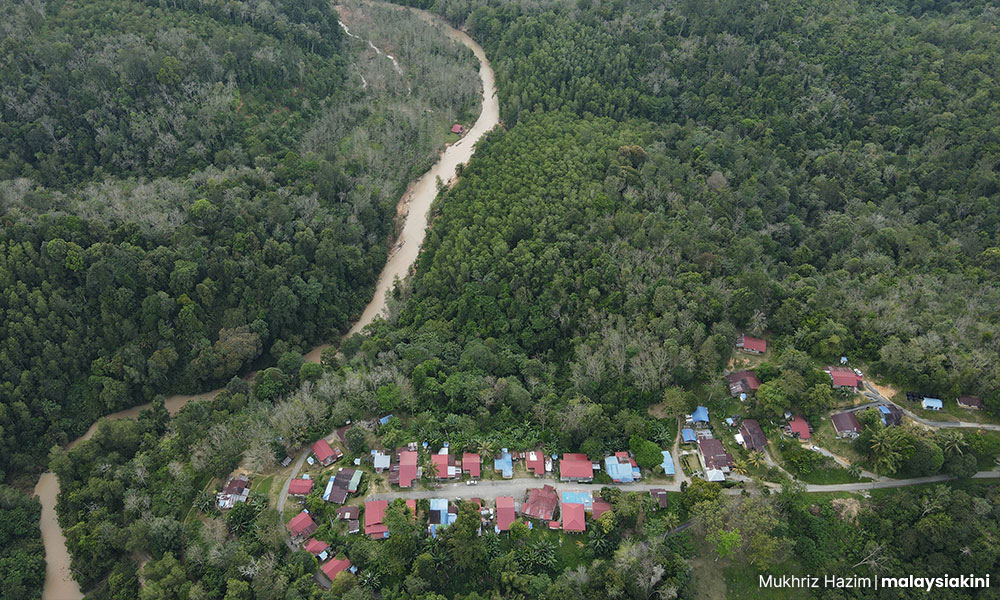Several organisations have called for Perak ruler Sultan Nazrin Shah’s intervention to help protect the Kledang Saiong Forest Reserve from being turned into a timber plantation.
They urged the sultan to pressure the state government to abide by the National Land Council resolution in 2021 to impose a 15-year moratorium on setting up new timber plantations in permanent forest reserves in Peninsular Malaysia.
They also hope that the ruler would push the authorities to consider cancelling the proposed plantation.
Two political parties and an assortment of NGOs gathered in front of Istana Iskandariah, Kuala Kangsar, yesterday to submit a memorandum to the sultan about the forest reserve.
The memorandum’s signatories include Pertubuhan Komuniti Sejahtera Aman Perak chairperson Ahmad Latfi Mohd Ibrahim, Parti Hijau Malaysia president Zabri Mokhtar, and Parti Sosialis Malaysia chairperson Dr Michael Jeyakumar Devaraj.
There are also six representatives from various NGOs, namely Meor Razak Meor Abdul Rahman (Sabahat Alam Malaysia), Mohd Rafi Zainal Abidin (Pertubuhan Sabahat Ekologi Perak), Hafizudin Nasarudin (Persatuan Aktivis Sahabat Alam), Ching Boon Tat (Pemerhati Lembah Kinta), and Dailami Zahari (Jawatankuasa Bertindak Kampung Rambai Tujuh).
Latfi said the memorandum was received by the sultan’s senior secretary Norzahari Efendy Zakaria in the afternoon.
Previously, Malaysiakini reported that an area the size of 5,994 football fields in Kledang Saioing is proposed to be converted into a timber plantation and operated for 50 years.
In their memorandum, the groups raised various concerns about the proposal ranging from environmental devastation and human-wildlife conflicts to an allegedly flawed environmental impact assessment (EIA) report.
They said plantations are known for their large-scale implementation that destroys the original forest cover through clear-cutting.
“In fact, the concept of a plantation contradicts the concept of a forest in terms of language and terminology.
“A plantation is a large-scale monoculture agricultural area filled with crops, while a natural forest is formed by the natural growth of vegetation and has high biodiversity and performs various ecological functions,” they said of the 4,280-hectare project.
They also alleged that the EIA and the social impact assessment (SIA) reports for the project did not comprehensively cover the entire population living near the proposed area.
The impacts of a reserve’s destruction
The groups also highlighted that the Kledang Saiong project site is a “wildlife corridor”, particularly for those fully protected under the Wildlife Conservation Act 2010.
This includes the leopard, Malayan sun bear, siamang, tapir, and leopard cat.

“It is possible for their habitats and range to be permanently lost, resulting in conflicts between humans and wildlife,” they said.
The sheer scale of the project and its location in an area with rich diversity also undermines national efforts to manage forests sustainably.
They also pointed out that some villagers near the project site collect and sell forestry products as their main source of income. The clearance of the site could affect the residents’ livelihood.
The project’s EIA report notes Orang Asli communities could lose income from harvesting non-timber forestry products such as kelulut honey, herbs such as tongkat ali, rattan, and vegetables from the forest.
Aside from that, the clearing of the forest and site preparation works could pollute and reduce the water quality of tributaries entering the Perak River, the groups said, through the resulting erosion, sedimentation, and silt.
“The resulting turbidity, silt, sediments, and oil contamination can impact the operation of water treatment plants located along the Perak River,” they added.
Lastly, they touched on how the project would cause adverse effects on air pollution and temperature rise as deforestation activities can release carbon dioxide, aerosols, and other pollutants into the air.
“This can affect the health of the population, as well as the fertility and growth of crops and plants cultivated by local residents,” they concluded. - Mkini



No comments:
Post a Comment
Note: Only a member of this blog may post a comment.